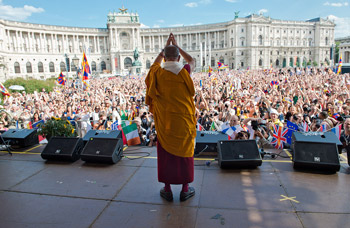
His Holiness the Dalai Lama: Moral ethics is linked with warm-heartedness. Warm- heartedness is tied up with the happiness of others. The happiness of others is ultimately the source of one's own happiness.
Public Talk Klagenfurt May 20, 2012 – The Art of Happiness
Trascript by Dr. Peter Lawrence-Roberts, first revision and editing by Dr. Luciano Villa within the project “Free Dalai Lama’s Teachings” for the benefit of all sentient beings. We apologize for possible errors and omissions.
His Holiness the Dalai Lama
Some feel that the term ‘secularism’ has negative connotations towards religion. Some have the view that any ethics must be based on religious belief.
In India the constitution is based on secularism. This doesn’t mean any disrespect for religion. India is a very religious minded society. So secularism means respect for all religions and for the rights of non believers. This is the basis of the Indian constitution, which was prepared by some very religiously minded people.
All sentient beings want more peace and to avoid disturbances. Everyone has the right to a happy life and to overcome suffering. We need a realistic method to reach that goal. Any unrealistic approach will lead to failure. As humans with intelligence we have a greater opportunity to take a realistic approach, both now and in the long term.
Sometimes we sacrifice short term happiness for long term benefit.
The sensory level of experience is temporary. When we see something as a tourist, or look at a work of art, we derive some pleasure through our eye sense or through our ear sense etc. All sensory pleasurable experience is temporary. Once it has passed it is just a memory.
Deeper experiences are to be had at the mental level. They are not dependent on sensory experiences and so remain longer.
So, experiences of pleasure and pain have two levels – sensory and mental. Modern society has become preoccupied with sensory and material experience and has neglected inner experiences.
It is very useful to make more use of mental faculties and not just rely on the sensory level. Experiences of disturbing emotions come from the mental level, even though they may be causes by the sensory level. We need first to pay more attention to our inner values and inner world. It is important to think about and watch our mind and our emotions. If we watch our minds when experiencing a strong emotion such as anger we will see that the negative emotion diminishes as we watch it.
Despite huge progress in research and understanding during the 20th century, it was the century of bloodshed and violence. More than 200 million people were killed through this violence.
We need to think more about inner values. There is an increasing gap between rich and poor. The scale of corruption is increasing, particularly in poorer countries.
Why do these things happen? It is due to a lack of principles and values. People go to church and pray but they are not serious about these principles in their daily lives. They lack self discipline and moral ethics. We must seek to make the 21st century a compassionate century. That is the way to achieve a more peaceful century.
Moral ethics is linked with warm-heartedness. Warm- heartedness is tied up with the happiness of others. The happiness of others is ultimately the source of one’s own happiness.
We have the seed of warm-heartedness in us from our mother. Young children do not care about money, power or social background. They care far more about affection and warm- heartedness. As we get older we get conditioned to ‘me’ being more important, to being supported by others. This is the source of corruption – ‘I’ should have it. It is better to think of ‘we’. Ultimately, the whole world is included in ‘we’. Then there would be no room for war, hatred, lying, cheating etc. This is not a matter of religion. Religion is a private matter.
Peace of mind is also good for our physical health. Fear, anger and hatred literally eat away at our immune system.
The vast majority of people respond positively to warm-heartedness. Even animals become less fearful and suspicious if we are open and warm.
If we want to be open and neutral we need a calm mind. If we have disturbing emotions we will be biased one way or another. This can then lead to further disturbances and suspicion of others.